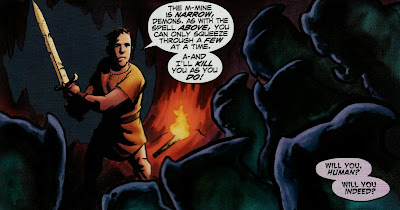It is in every way the ending to the story and thus obviously constitutes a major spoiler if you're interested in reading it but as it's really quite a short tale, only tangentially related to the Dark Horse Conan series, and a one-off at that, I'm of the opinion that it isn't necessary to be up to date or even to be familiar with Conan as a character to get the gist of what is being presented. More than that, this page on its own, as a whole, speaks volumes.
During the last days of the year the more morbidly inclined of us (or those more thoughtful than others) traditionally tend to dwell on the lingering pain of the past and the sorrows yet to come.
And sorrow will come because logic and reason dictates us that it will. Pain is an inescapable part of the human condition. We suffer from loss, loneliness, guilt, feelings of inadequacy, from having no purpose, no direction, from a sheer host of anxieties and uncertainties and, at times, things can get awfully bleak. And for some of us, overwhelmingly so.
Robert E. Howard wrote many stories and has had an incalculable influence on the fantasy genre as a whole. He created Conan, the world's most famous barbarian. A character around which entire libraries' worth of books, fiction and non-fiction, have sprung up. The Conan stories themselves however number relatively few. There aren't many of them. And the panel above comes from a story called The Storyteller that was never even written by Howard.
He could've written it, maybe, but we'll never know, because Robert E. Howard committed suicide at the age of 30. He shot himself in the head, after he had received news that his mother had slipped into a coma from which she would never regain consciousness.
Despite the choice of his way out, he didn't die instantaneously and lived for another 8 hours. His mother only died the next day.
In The Storyteller, through the medium of dispassionate but earnest narration, we are introduced to our tragic protagonist as he works on his father's farm, uncomplainingly doing his duty, providing the hard labour that his father has ceased being able to provide, all the while dreaming of the wider world stretching out around him, the colourful characters it might contain and the wild and dangerous adventures they undoubtedly have.
In the evening, at the tavern, fuelled by the stories of travelers, he spins his tales and shares his dreams to a rapt and appreciative audience.
But this very imagination sets him apart and though his audience cheers and gasps in all the right places, it also silently calls him touched, it calls him fool, and for his virtue, they demean him.
Knowing he will never have his own adventures the young nonetheless sets out to do what is expected of him.
And then a barbarian rides into town dragging his own wild and dangerous adventure with him.
As a priest casts a spell to keep the monsters out for as long as possible the barbarian commands the townspeople to fight alongside him as their village is threatened to be overrun by slavering monstrosities.
And for a time, through violence and bloodshed, the monsters are held at bay.
Until the moment when our young storyteller remembers the stories told to him by others, by those already familiar with the darker creatures of the world.
And so, the boy tries to rally his fellows to prevent what is a certain doom.
But, they ignore him.
Dismiss him.
And so, without options, the boy does his duty.
And while the battle rages outside, he goes to the mine on his own.
Where his worst fear meets him with tooth and claw.
And the night wears on and the desperation grows on all fronts
In the face of fear and certain death, there are incredible acts of bravery and courage as men fight for their lives, for their families and all that they have.
And when the sun's earliest rays finally bathe the besieged village, their brightness burns away the horrors of the night.
And as the men rejoice it is noticed that the young storyteller is not among them. He is presumed to have fled.
They don't find his body for two weeks. Having sought some privacy, two young lovers find his bruised and battered body in the mine where he made his stand.
He fought long enough to prevent most of the monsters from getting past him until they rushed out into the sunlight. With only gashes and a nicked and dented sword as evidence of having done his duty, they name him coward. Madboy.
And as the story closes, the dispassionate narration reveals itself to be filled with hidden feeling. With respect and admiration, and sorrow. It acknowledges the skill, passion and creativity of the dead boy, even if nobody else ever will.
At its close, the Storyteller reveals itself as a lament for the stories never told, and a lament for those that didn't get to tell them. A lament for Howard who could have written so much more. It's not an accident that the boy was drawn in his likeness.
I read the tale a week ago, when I was stuck in one of the worst periods in memory, and it served me well. It reminded me that people still love me, and that they love the things that I do, and that I shouldn't take my love, my promise and potential away from them.
We all have stories, we all have creativity to share and though I'm not exactly planning on writing any novels, I think I'll stick around and keep being creative for a while yet.



















No comments:
Post a Comment